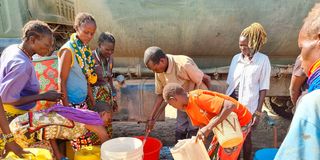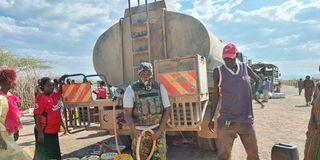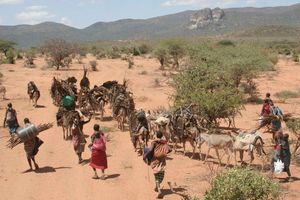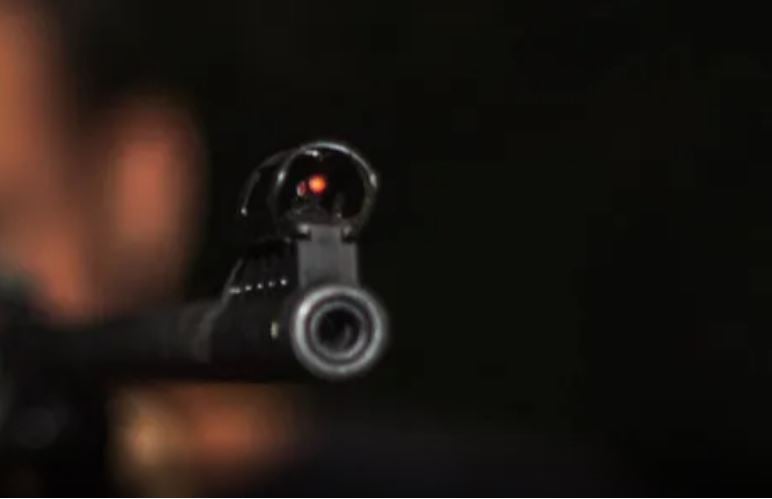Water crisis, gun-toting bandits and deaths: The unending woes of Lomelo residents

Residents of Lomelo village in Turkana East fetching water that had been trucked by the military on February 17, 2025
What you need to know:
- Sarah Amunyen, 33, was shot in the head and died on the spot. Charity Lonyapid, 40, survived with serious gunshot wounds on her head, while Emuria Lodoko was shot in the hip.
On the evening of March 18, residents of Lomelo village in Turkana East set off in a group to Naatuk River, approximately seven kilometres away, to fetch water, as was the norm.
Walking the long distance is not a guarantee that one will get water from the river as sometimes they have to dig burrow-like wells from dried-up riverbeds.

A military officer helping locals fetch water that KDF had trucked to the far-flung Lomelo village in Turkana East on February 17, 2025.
This community’s troubles don’t end there as water collection has become deadly. Bandits have exploited the crisis, turning water points into danger zones.
For security purposes, the locals have to be accompanied by national police reservists when they travel to find water.
But sometimes police escorts are rare, leaving them vulnerable to armed attacks.
On this fateful day, Lomelo residents took a chance, resorting to going on their own.
An hour after arriving at their destination, three armed men approached some women who were drawing water from the well and requested for some to drink. This was after inquiring if the women had seen a missing goat.
Shortly after, gunshots rent the air as the armed men started shooting at the women indiscriminately.
“By the time the gunshots went silent, one woman had been felled by the bandit’s bullet, and two others sustained serious injuries,” recalls Cornelius Long’or, who had accompanied the women.
Sarah Amunyen, 33, was shot in the head and died on the spot. Charity Lonyapid, 40, survived with serious gunshot wounds on her head, while Emuria Lodoko was shot in the hip.
The duo was treated at Lomelo dispensary before being referred to a Nakuru hospital for specialised medical attention, where they are still recuperating. This has been the norm for residents of the far-flung Lomelo village in Turkana East, where water crisis remains a thorn in their flesh.
Their woes have persisted since last July when the pumping system of a borehole serving the locality failed, forcing them to fetch water at a nearby stream and risk attacks from bandits who roam the area freely.
With the long dry spell, the seasonal stream has dried up, forcing them to spend hours digging burrow-like wells on dry river beds.
“We are tempted to think that we are lesser Kenyans because how on earth, in this century, does one have to walk for dozens of kilometres in search of water, 12 years after devolution? This is an arid area with no reliable source of water, but we have raised our concerns since July last year when the water pump failed. Sadly, our pleas have fallen on deaf ears,” said Mr Long’or.
He added: “We have lost many people here and we are still grappling with water crisis and insecurity. Despite the challenges, we cannot live without water. We will still go to the river of death despite the attacks.” The water crisis is also having adverse impacts on vulnerable learners in the area.
According to Maxwell Napai, a resident, the crisis has caused rampant absenteeism in learning institutions as children accompany their parents in search of water, an activity that sometimes takes the whole night just to secure a container.
Climate Action learnt that one time when the wells dried up, residents were forced to walk for three days to the neighbouring Kapedo, more than 43km away, looking for water.
“The situation here is dire. Being an arid area with high temperatures, one needs to keep drinking water, yet getting even a single cup is a headache. We have a borehole at the locality, but its pumping system failed eight months ago, forcing us to fetch water at a stream nearby, which has now dried up completely due to the long dry spell,” said Mr Napai.
He added: We no longer engage in meaningful activity, and children have also been forced to skip school to help their families search for water.”
He also expressed fears that some schools in the locality such as Nadome and Silale Primary may be closed due to the water crisis.
“There is no water for cooking meals, and some pupils have also migrated with their parents in search of water for livestock. We wonder why it has taken close to a year for the county government to respond to our plight, yet this is an arid area with no major source of water,” he noted.
Peter Kamaro, a primary school teacher, said: “School enrolment has drastically dropped in many institutions this term because most of the water crisis. If no urgent interventions are taken, all the schools in this area will be closed.”
The crisis, he said, has forced the community to take their livestock further afield in search of water and pasture, a move that has caused inter-communal tensions and violence in some areas.
Suguta Sub-county Deputy County Commissioner Franklin Ongori confirmed the attack that claimed the life of Sarah and left Emuria and Charity injured.
“The attack is suspected to have been carried out by armed bandits residing within Lomelo. Security teams responded swiftly, and efforts to apprehend the culprits are ongoing,” he said.
Mr Ongori noted that the crisis has persisted for close to a year after the breakdown of the pumping machine, adding that the government had delivered 100,000 litres to ease the crisis.
He said he liaised with the military base in Chesitet and supplied water to the affected locals twice. However, he accused the county government of failing to address the crisis.
“Locals will die if no urgent interventions are taken to address the issue. I have tried my best, including mobilising the Kenya Defence Forces to supply water, which they did twice. I have also used my resources to fuel water boozers, but the locals need water regularly, so trucking is just a temporary measure. The county government should wake up from slumber and do the needful”
Turkana County Chief Officer for Water Services Simon Ekai said he was aware of the water crisis in Lomelo, noting that the Department of Water was working on the rehabilitation of the reverse osmosis plant.
"Reverse osmosis system, unlike other systems like solar pumps, can't be fixed by our technical team. This is largely outsourced. We have assessed Lomelo water system, but it took some time to get an expert willing to go to the area due to insecurity challenges. We hope to fix it soon," Mr Ekai said.
Water experts agree that osmosis technology is expensive to acquire but is worth it when it comes to ensuring a sustainable supply of potable water.


